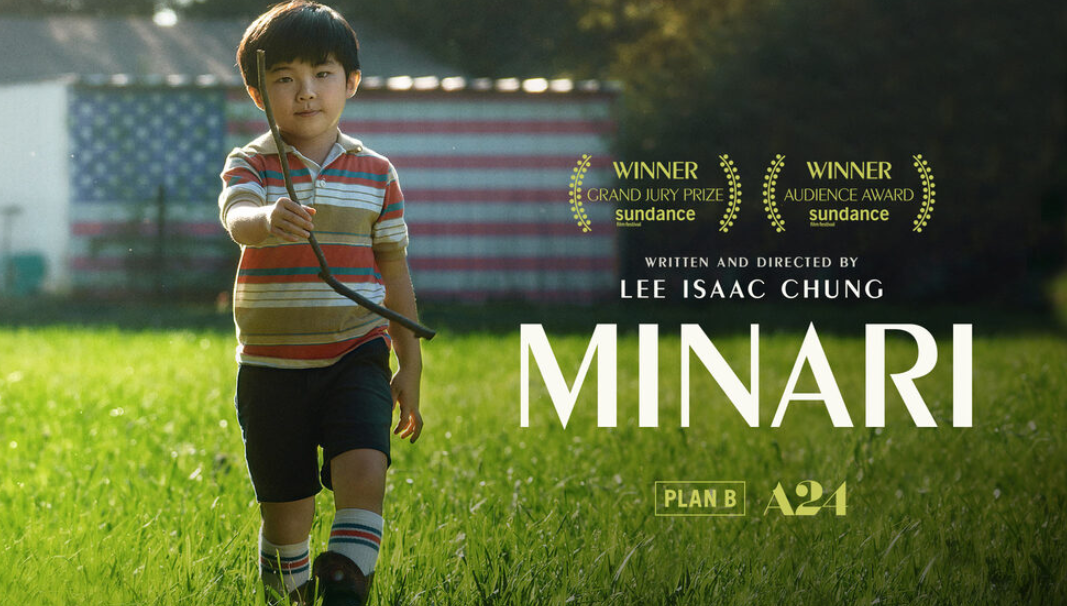Lee Chung’s semi-autobiographical Minari is a love letter to the American Dream. Premiering at the Sundance Film Festival on January 26, 2020, Chung’s fourth feature film radiates comfort in every scene, dripping passion and hazy familiarity from every shot.
The plot follows the Korean Yi family circa 1983 and their struggle to plant roots, literally and figuratively, in their new home of Arkansas.
As they settle into their unfamiliar plot of land in the Ozarks, conflict arises within the family from the very beginning; Jacob, his father, Steven Yuen, and his mother, Monica Han Ye-ri, disagree over their new farm’s house, a mobile home in the middle of a sprawling field. Moments like this reappear and incite strife frequently throughout the feature, from the young son David’s heart condition to the lackluster first harvest of the year. The family of five seem to be unable to catch a break.
All of these grievances are, however, eased through the comfort of love.
Regardless of what happens to the Yi family, they have each other, and that is enough. Minari is filled with tender, emotional scenes of familial struggle and triumph, scenes such as Monica’s mother moving in and the overjoyed reunification and tears that follow from years of absence.
This is what moves us as viewers and leaves us sitting in the dark, late at night, pondering our own existences and relationships with one another. Minari hits a melancholy nail in the painful yet surreal structure of the human experience, reminding us of our own individual hardships and the support from those we love.
The bouts of an immigrant family are a common trope in American literature and cinema, and Minari is an excellent example of it. Though their differences from their rural community are plentiful, the isolated Arkansas town receives them warmly.
In the infrequent scenes of the Yi family’s public relations, there is little conflict to be found. The townspeople and new immigrant family are equally unique in their mannerisms and quirks, such as Paul, Jacob’s eccentric and devotedly evangelical farmhand who carries a homemade cross every Sunday down the winding dirt paths of the farmland’s backroads.
Minari establishes itself in the opening moments as a movie about uncomfortability and transition, doing so by highlighting the dreary, familiar feeling of riding in the car as a child, headed off to a new home far removed from what is familiar. The family’s senses and minds seem overwhelmed at times, consumed whole by the magnitude of their situation.
Nothing in the film’s plotline is free—only by grueling, hard work does anything get done. Jacob serves as a walking symbol of the traditional patriarchal figure of loving masculinity and the grit to overcome any situation he is plagued with in the pursuit of stability and a comfortable life for his family. Unconditional love is the Yi family’s only means of persevering through their fearful leap of faith. At times, even this simple act is nearly unbearably hard.
Love, family and hard work are naturally demonstrated as the core themes of this movie. Each rising and falling action flows like waves, with the family’s small boat being constantly rocked—but never capsizing. They trudge onwards, through the fog and past their worries.
Minari’s cinematography revolves around the blurry, saturated lens of childhood. Many of the shots in this film feel like a dream–hazy and nostalgic. Picturesque rolling fields and rusty nails compliment the intimate close-ups of tense dialogue scenes, breaking the tension of the Yi family’s struggle with the beauty of their new home.
In my opinion, Minari’s acting and cast are as close to perfect for this movie as it could be. Steven Yuen’s performance is incredible, something seen in most of his other roles, such as The Walking Dead and Beef. Raw, emotional scenes are played wonderfully and flow as one would expect a real familial conversation to look and sound.
Immersion was never lost for me within the confines of the movie’s entire runtime. I was glued to my television, completely drowning in the substance of this film. There is humor to be found, indeed, but it never detracts from the experience as a whole. All of the scenes feel real, and it’s crucial to the story that they do.
